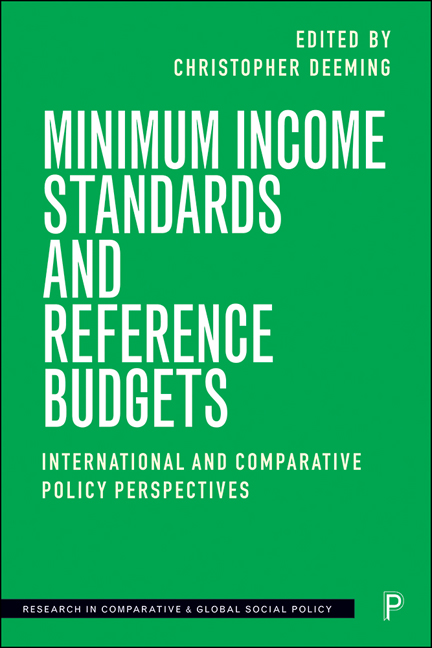18 - The Steep and Winding Road to Comparable Reference Budgets in Europe
Published online by Cambridge University Press: 12 March 2021
Summary
Introduction
Over the past 30 years, the European Council, the European Commission (EC) and the European Parliament (EP) have emphasised the importance of active inclusion policies and adequate minimum income support. Most recently, the EU's initiative on the European Pillar of Social Rights stresses again a series of economic and social rights, including the right of workers to ‘fair wages that provide for a decent standard of living’, the right of children to ‘affordable early childhood education and care of good quality’ and ‘protection from poverty’, the right of the unemployed to ‘adequate unemployment benefits’ and the right of everyone to ‘adequate minimum income benefits ensuring a life in dignity at all stages of life, and effective access to enabling goods and services’. Finally, ‘[e] veryone has the right to access essential services of good quality’ (EC, 2017). However, what is a ‘decent standard of living’, what are ‘essential services’, when can we consider something ‘affordable’ and what are the minimum resources that ensure ‘a life in dignity’?
‘Reference budgets’ offer probably the most straightforward tool for answering these questions. To some degree, this has also been recognised by the EC. For instance, as part of the Social Investment Package adopted in February 2013, the EC (2013) proposed the use of reference budgets as an instrument to help member states design efficient and adequate income support and to facilitate the Commission's task of monitoring the adequacy of income support in Europe. With some exceptions, however, existing reference budgets were largely created independently of one another, using different methods, with the effect that results are not comparable between countries (for a review, see Storms et al, 2014). Reference budgets can only be used to assess whether income support measures are more adequate in one country than in another, and why this is the case, if they are comparable across countries. Only then it is possible to set up a process of policy learning regarding how different countries succeed in guaranteeing adequate incomes and which policy reforms could lead to a structural improvement of income adequacy. This was also recognised by the EC, when it launched a pilot project to develop a common methodology for comparable reference budgets in Europe, as well as by other important social actors, such as the European Economic and Social Committee (2018) and NGOs advocating for adequate minimum income schemes throughout Europe (Van Lancker and Farrell, 2018).
- Type
- Chapter
- Information
- Minimum Income Standards and Reference BudgetsInternational and Comparative Policy Perspectives, pp. 255 - 270Publisher: Bristol University PressPrint publication year: 2020



